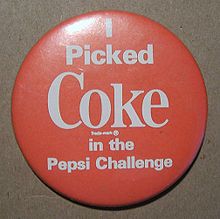Pepsi Challenge
This article needs additional citations for verification. (August 2007) |
The Pepsi Challenge has been an ongoing marketing promotion run by PepsiCo since 1975. It is also the name of a cross country ski race at Giant's Ridge Ski Area in Biwabik, Minnesota, an event sponsored by Pepsi.[1]
Method
1975-2010

The challenge originally took the form of a single blind taste test. At malls, shopping centers, and other public locations, a Pepsi representative sets up a table with two white cups: one containing Pepsi and one with Coca-Cola. Shoppers are encouraged to taste both colas, and then select which drink they prefer. Then the representative reveals the two bottles so the taster can see whether they preferred Coke or Pepsi. The results of the test leaned toward a consensus that Pepsi was preferred by more Americans.[2]
Coca-Cola ran a series of ads lampooning the Pepsi Challenge.[when?] In one of them, the subject preferred the taste of a tennis ball.[citation needed] (Yet another lampoon reportedly had chimpanzees comparing tennis balls.[citation needed])
In 1981, Pepsi ran a "Pepsi Challenge Payoff" contest that would hand out a large prize to anyone who could gather Pepsi bottle caps that spelled out the word "challenge". Each bottle cap had a single letter beneath it. The letter "A" was the rarest, making it challenging to win the prize.[citation needed]
The Pepsi Challenge taste test ad campaign is frequently credited for Coca-Cola's decision to introduce New Coke in 1985.[citation needed]
Criticism

In his book Blink: The Power of Thinking Without Thinking (2005), author Malcolm Gladwell presents evidence that suggests Pepsi's success over Coca-Cola in the "Pepsi Challenge" is a result of the flawed nature of the "sip test" method. His research shows that tasters will generally prefer the sweeter of two beverages based on a single sip, even if they prefer a less sweet beverage over the course of an entire can.[3]
When the preference in blind tests is compared to tests wherein cups are labeled with arbitrary labels (e.g., S or L) or brand names, the ratings of preference change.[4] Scientific findings do support a perceptible difference between Coca-Cola and Pepsi, but not between Pepsi and RC Cola.[5]
Meanwhile, many participants recalled a difference in temperature between the two drinks. According to these claims, Pepsi was served chilled, while Coca-Cola was served at room temperature, thus making the Pepsi more appealing.[citation needed]
The band Negativland lampooned Pepsi and the Pepsi challenge on their album Dispepsi(1997), and several Pepsi commercials were sampled from the era of the Pepsi Challenge.[citation needed]
See also
Notes
- ^ "The Pepsi Challenge Cup Cross Country Ski Race!". Pepsichallengeskirace.com. Archived from the original on February 3, 2009. Retrieved December 27, 2012.
- ^ "Knew Coke". Snopes. May 19, 2011. Retrieved December 27, 2012.
- ^ "The Zen Of Choosing". Trust Me, I'm A Scientist.
- ^ Woolfolk, Castellan, Brooks
- ^ Pronko, Herman
References
- Koenigs, M., Tranel, D. (2008). Prefrontal cortex damage abolishes brand-cued changes in cola preference. Social Cognitive and Affective Neuroscience, 3, 1-6.
- Pronko, N.H., Herman, D.T. (1950). Identification of cola beverages. IV. Postscript. Journal of Applied Psychology, 34, 68-69.
- Woolfolk, ME; Castellan, W; Brooks, CI (1983). "Pepsi versus Coke: Labels, not tastes, prevail" (PDF). Psychological Reports. 52: 185–186. doi:10.2466/pr0.1983.52.1.185.
